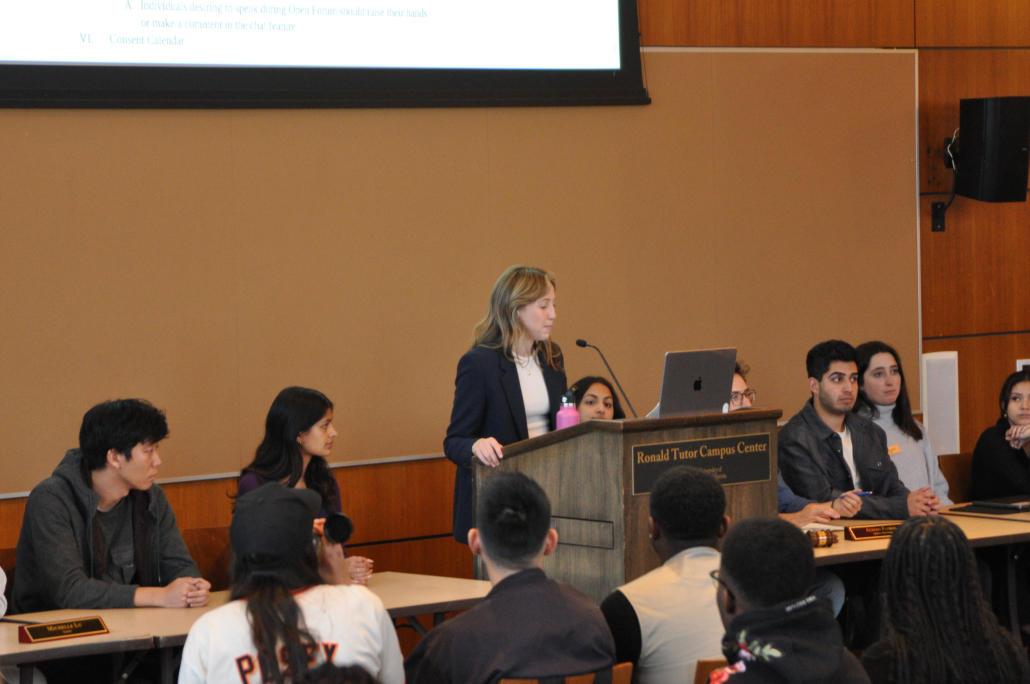Hannah Woodworth talks state of USG in final speech

In the penultimate Undergraduate Student Government meeting of the year, USG president Hannah Woodworth gave her final speech, recapitulating the highs and lows of the student government’s work over the past school year.
Woodworth reflected on the difficulties of transitioning back to running in-person operations, saying USG had responded by fostering “strong, lasting partnerships” with organizations across campus to create “informed and realistic solutions.”
Woodworth highlighted accomplishments such as the success of the LAX shuttle program, with ridership reaching over 4,000 students since its launch in October 2022. The University has since permanently picked up the shuttle program, she said, freeing up space for other initiatives in USG’s budget.
“We are proud to announce that the University is taking over this program and increasing its capacity for shuttles ahead of [winter break], beginning next year,” she said.
Other improvements Woodworth mentioned included the rise in funding requests — 166 Recognized Student Organizations requested funds, exhausting 98% of the funding budget as compared to the 64% from the previous year, and the change in the “organizational culture” across USG’s cabinet.
“From day one, our cabinet committed to being in the office day in and day out. That didn’t just mean meeting physically in the office — it meant committing yourself to the role,” Woodworth said.
However, a key area for improvement was the relationship between student organizations and USG. After meeting with 20 student leaders of organizations including Rocket Propulsion Lab, Troy Camp and Questbridge, USG was able to identify the gaps between the perception of student government and the tangible actions they have taken.
“Our biggest area of improvement, according to RSO leaders, was funding,” Woodworth said. “So, we [reduced] what used to be 26 pages of funding guidelines to four.”
Woodworth noted some students felt that USG only reached out to the student body when they wanted something from them, which Woodworth described as “backwards.”
“It is our goal to serve a student body, not just expect something from them, so we needed to change that,” Woodworth said. “So, we revamped our outreach systems both digitally and in person.”
The effects of the outreach manifested in increased follower counts and impressions across USG-affiliated social media accounts, as well as increased attendance to events going on in and around campus, led by 15 assemblies hosting more than 170 events, Woodworth said. The programming department also ensured the representation of new student bodies like Middle Eastern and North African Student Assembly and the Joint Assembly for Military-Associated Students.
Woodworth also recounted the slew of bills addressing student grievances and issues, such as the joint MENASA bill calling for support and outreach to Turkish and Syrian students during a Feb. 14 meeting.
Vice president Nivea Krishnan also spoke, discussing her initiative to join students and administrators together to discuss pressing student issues such as housing, food and campus safety — to wide success.
“I entered honestly a little bit nervous that things would get contentious, but I’ve been excited and pleasantly surprised to see students speak up and voice their thoughts in a civil and productive way,” Krishnan said.
Ending her speech, Woodworth urged the incoming administration to “be courageous in your advocacy” and to be “generous in showing gratitude” — advice which, if followed, would show that “the sky’s the limit.”
“It’s been the honor of a lifetime,” she said. “Thank you all so much, and for one last time, as always, Fight On.”

